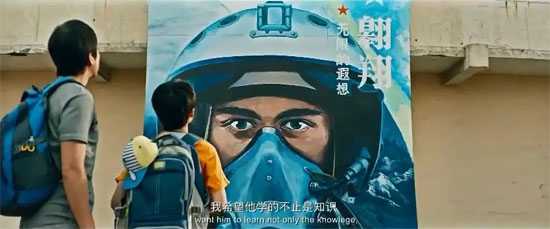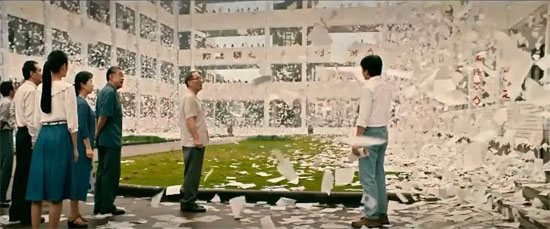Film Name:銀河補習班 / Looking Up
This July has seen quite a few films pulled from release, consequently giving more breathing room to other concurrent releases. Among them, the one with the strongest potential to become a hit lately is probably “Looking Up,” which has been moved up to an earlier release date.
The film is currently undergoing large-scale preview screenings—a move typically made by those confident in their product’s quality. Coupled with the solid word-of-mouth that’s already been circulating, it’s enough to make me want to check it out firsthand.

Honestly, the viewing experience of “Looking Up” wasn’t particularly pleasant. It’s not that it’s a “bad movie,” but rather that the creative duo of Deng Chao and Yu Baimei, while their attitude toward creation is commendable, still lack the necessary polish overall…
We often say “present facts and reason logically.” While “Looking Up” can’t be faulted much on the ‘logic’ front, its “presentation of facts” falls short. For a commercial film, this is fundamental—and the more crucial quality.
[Friendly reminder: The following contains major spoilers.]
My strongest impression of the film is that it feels “overloaded with elements” and “pieced together haphazardly”… though that’s not necessarily meant as criticism.
“Looking Up” weaves its narrative across two timelines spanning up to 30 years, sprinkling in numerous “era-specific memories” to heighten its sense of period and nostalgia. For instance, the story of Ma Haowen and Ma Fei begins with the torch relay for the 1990 Beijing Asian Games.

“We are Asia, mountains are our proud heads; We are Asia, rivers like blood flowing through our veins.” Anyone of a certain age will have Wei Wei’s “Asian Pride” melody echoing in their mind. 1992 saw Schlapper lead China’s men’s football team to third place in the Asian Cup; 1997 witnessed Hong Kong’s return; 1998 brought catastrophic floods; the passing of Leslie Cheung in 2003, along with “The Crescent Moon,” “The Love of Yesteryear,” and the 586 computer…
To be fair, the film’s use of “period elements” is fairly standard. Considering the enduring popularity of “nostalgia trends” both domestically and internationally, this can be seen as a minor advantage.
However, “Looking Up” feels cluttered in its other additions. The dual narratives of the “father-son storyline” and the “education storyline” already pack the film to the brim. Throwing in national pride and patriotic themes with a few strokes makes it feel overly ambitious and ill-fitting.

Even when the film should have focused its energy on key moments, the execution falls short. Take the space encounter between astronauts Ma Fei and Gu Xinghe, for instance.
I fully support using the nation’s space program as inspiration for commercial filmmaking. Objectively, however, the film fails to make this crisis compelling enough—especially the climactic sequence where Ma Fei rushes out of the spacecraft to repair communications. Neither the dangers he faces nor the solutions he implements sufficiently elevate this scene as the film’s climax (its dramatic impact and intensity pale in comparison to Ma Fei’s self-rescue in the flood).
The above issues are merely “less than ideal.” In contrast, “Looking Up” suffers from its most significant flaw: forced dramatic conflict that feels contrived and contrived.

After the Dongpei Bridge collapse, Ma Haowen took the fall and served seven years in prison. Most of the film’s conflicts revolve around or stem from this central event, which is understandable… but is the suffering of the Ma family the entirety of life?
After Ma Haowen’s release, his former colleagues greet “Engineer Ma” with accusations of “how much did you embezzle?” and curses of “you cost us our wages.” His job hunt ends with public humiliation by Liu Balang. These blush-inducing, rage-fueled moments are real—yet we know life often involves whispered gossip and pointed fingers behind closed doors. To achieve immediate, sensational impact, The film exclusively employs “hot satire,” overlooking “cold sarcasm.”
Similar plot points include: Ma Fei being mysteriously chased by street thugs after his father “dumps” him on the way to school; forcing Ma Haowen into backbreaking labor and blood sales without clarifying Ma Fei’s financial support obligations; Ma Fei—whose father has a “criminal record”—qualifying as a pilot and even an astronaut candidate, only for “family background” to resurface as a factor before final selection…

The most glaring example is the scene where Ma Haowen forces Ma Fei to save himself from drowning in the flood. The attempt to highlight Ma Fei’s “independent thinking and action capabilities” feels so contrived that it creates numerous inconsistencies throughout the narrative:
After all, getting separated from loved ones due to boarding the wrong vehicle or a sudden downpour is a real possibility—audiences can easily imagine plausible scenarios themselves… Once or twice might be acceptable, but the film is littered with such coincidences and contrived situations that it frequently pulls viewers out of the narrative.
The film’s execution feels like shooting an arrow in a general direction, then drawing a target around where it lands—designing problems to fit predetermined answers rather than letting motivation drive outcomes… The final result isn’t terrible, but it simply lacks sophistication.

Next, let’s address the “educational philosophy” conveyed by the film—the core theme that sparks the most widespread discussion and controversy in Looking Up.
Ma Haowen’s advocacy—”children need to cultivate independent thinking, bravely face the world, and pursue what they love”—is fundamentally sound. After all, life isn’t like multiple-choice exams with clear A, B, C, or D options and a single correct answer. It offers E, F, G, H, I, J, K, L, and N choices, and sometimes even X, Y, or Z solutions…
Yet Ma Haowen’s actual educational approach seems almost too “idealistic” to be a product of our era—skipping homework to play video games, spending half a month sightseeing and attending air shows before exams. At the very least, it’s not something many parents could afford to do.

Ma Haowen’s core educational philosophy is less about “education for all” and more about “teaching according to individual aptitude.” Ma Fei was exceptional—and exceptionally fortunate. Under his father’s guidance, he wasn’t sidelined by “tradition” to sell pancakes but became one astronaut in a million. But what about other children?
Most people spend their entire lives unsure of their true calling, let alone during the bewildered years of childhood (though formative experiences do shape adulthood). And most children won’t discover academic passions through such playful pursuits—they simply enjoy the play itself… In truth, Principal Yan’s exam-focused “grades-only” philosophy holds far greater universal applicability.
This isn’t to cheer for the dry, mechanical “exam-oriented education,” nor to dismiss the value of Ma Haowen’s “holistic education” in unlocking potential. Rather, it’s to say that as a film discussing education, “Looking Up” essentially relies on the same outdated, one-sided arguments about middle schoolers that were popular over a decade ago—a perspective that feels decidedly immature.

What saddens me most is the scene after the college entrance exams where students tear up their textbooks in frustration, and the conversation between Ma Haowen and Director Yan amidst the swirling paper shreds—this sequence had the potential to elevate the film’s theme and transform it entirely. Yet, after Ma Haowen suggests that “students don’t truly love learning,” he merely recounts the story of “the madman being Director Yan’s son driven to insanity.”
This revelation raises an incredibly sharp question, yet it remains shallow. In a film lacking dialectical perspective, its nature—like other scenes—only scratches the surface, differing only in its “escalated intensity.”
Education has no formula. “Looking Up” at least articulates this point. As for the film’s later shift toward a peculiar form of “success doctrine,” let’s view it dialectically… …

Don’t misunderstand—though this review adopts a predominantly critical tone, I evaluate “Looking Up” against the benchmark of an “excellent film.” It could have been better; if it were purely trash, I wouldn’t bother expending this much ink.
In fact, considering the slapstick antics of Deng Chao and Yu Baimei’s previous films The Breakup Guru and Devil and Angel, the seriousness they bring to Looking Up deserves major praise: at the very least, they’ve stumbled and stumbled again to tell a beautiful story.
Please specify:Anime Phone Cases » Looking Up 銀河補習班 2019 Film Review: Shoot the arrow first, then draw the target.